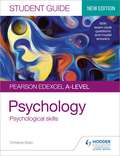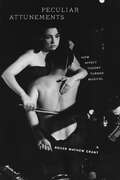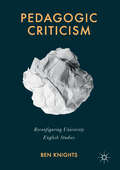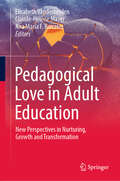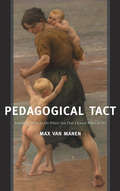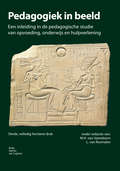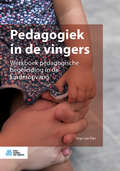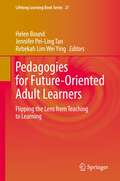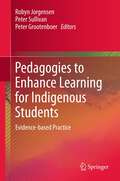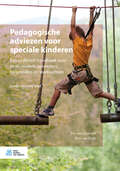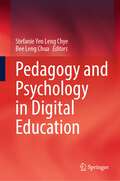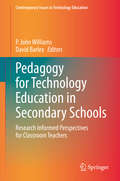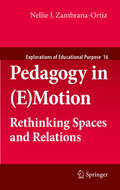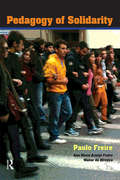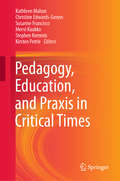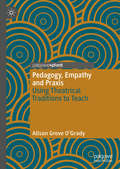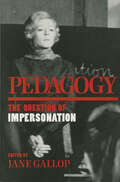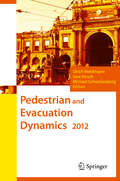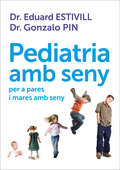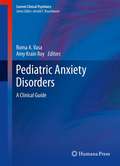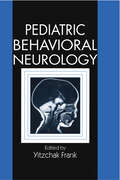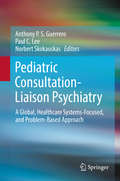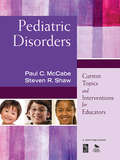- Table View
- List View
Pearson Edexcel A-level Psychology Student Guide 3: Psychological skills
by Christine BrainReinforce understanding throughout the course with clear topic summaries and sample questions and answers to help students target higher grades.Written by experienced teacher and subject expert Christine Brain, our Student Guides are divided into two key sections - content guidance, and sample questions and answers.Content guidance will:- - Develop understanding of key concepts and terminology; this guide covers psychological skills, including methods, a synoptic review of studies, issues and debates.- Consolidate knowledge with 'knowledge check questions' at the end of each topic and answers in the back of the book.Sample questions and answers will:- - Build understanding of the different question types, so that students can approach each question with confidence.- - Enable students to target top grades in Paper 3 with sample answers and commentary explaining exactly why marks have been awarded.
Pearson Edexcel A-level Psychology Student Guide 3: Psychological skills
by Christine BrainReinforce understanding throughout the course with clear topic summaries and sample questions and answers to help students target higher grades.Written by experienced teacher and subject expert Christine Brain, our Student Guides are divided into two key sections - content guidance, and sample questions and answers.Content guidance will:- - Develop understanding of key concepts and terminology; this guide covers psychological skills, including methods, a synoptic review of studies, issues and debates.- Consolidate knowledge with 'knowledge check questions' at the end of each topic and answers in the back of the book.Sample questions and answers will:- - Build understanding of the different question types, so that students can approach each question with confidence.- - Enable students to target top grades in Paper 3 with sample answers and commentary explaining exactly why marks have been awarded.
Peculiar Attunements: How Affect Theory Turned Musical
by Roger Mathew GrantPeculiar Attunements places the recent turn to affect into conversation with a parallel movement in European music theory of the eighteenth century. During that time the affects—or passions, as they were also called—formed a vital component of a mimetic model of the arts. Eighteenth-century critics held that artworks imitated or copied the natural world in order to produce copies of the affects in their beholders. But music caused a problem for such theories, since it wasn’t apparent that musical tones could imitate anything with any dependability, beyond the rare thunderclap or birdcall.Struggling to articulate how it was that music managed to move its auditors without imitation, certain theorists developed a new affect theory crafted especially for music, postulating that music’s physical materiality as sound vibrated the nerves of listeners and attuned them to the affects through sympathetic resonance. This was a theory of affective attunement that bypassed the entire structure of representation, offering a non-discursive, corporeal alternative. It is a pendant to contemporary theories of affect, and one from which they have much to learn. Inflecting our current intellectual moment through eighteenth-century music theory and aesthetics, this book offers a reassessment of affect theory’s common systems and processes. It offers a new way of thinking through affect dialectically, drawing attention to patterns and problems in affect theory that we have been given to repeating. Finally, taking a cue from eighteenth-century theory, it gives renewed attention to the objects that generate affects in subjects.
Pedagogic Criticism
by Ben KnightsThis book argues that the history of English Studies is embedded in its classroom practice, and its practice in its history. Some of its foundational struggles are still being lived out today. English is characterized as a 'boundary' subject, active in dialogue across a number of imagined borders, especially those between academic and non-specialized readerships. While the subject discipline maintains strong pedagogic principles, many of its principles and values are obscure or even invisible to students and potential students. The book cross-fertilizes the study of English as a subject with the analysis of selected literary texts read as pedagogic parables. It concludes with a call for a return to the subject's pedagogic roots.
Pedagogical Love in Adult Education: New Perspectives in Nurturing, Growth and Transformation
by Elisabeth Vanderheiden Claude-Hélène Mayer Ana Maria F. BarcelosThis volume explores the concept of pedagogical love, highlighting its role as a transformative force across diverse educational contexts, historical developments, and its integration into educational systems. It provides both theoretical insights and methodological approaches to pedagogical love. The book opens with foundational chapters introducing the concept and progresses to situating it within frameworks such as decolonisation and critical pedagogy. It further examines its potential in teacher education, addressing specific pedagogical domains such as second language acquisition and literacy, as well as cultural contexts spanning Asia, Europe, Africa, and the Americas. Moreover, the book investigates the implications of pedagogical love in current transformations and digitalisation, with particular attention to fully digital environments and artificial intelligence. By offering a comprehensive overview and presenting innovative perspectives for research in adult education, this book serves as an essential resource for researchers, educators, and practitioners. "This edited collection delves into the transformative power of pedagogical love in adult education, challenging conventional views of love as merely &‘soft&’ and personal. By exploring critical and decolonial perspectives, the book opens new avenues for research and practice, advocating for love as a profound ethical and political force to confront social injustices and transform educational spaces…Bridging critical and decolonial approaches, this volume reimagines pedagogical love as a key to transformation in adult education. It moves beyond sentimental notions to show how love can address challenges like violence, colonialism, and social inequity, offering a renewed perspective on love&’s role in shaping the future of education" Michalinos Zembylas, Open University of Cyprus "Pedagogical love is the root and foundation of all adult education" Kaarina Määttä, Professor (emerita), University of Lapland
Pedagogical Tact: Knowing What to Do When You Don’t Know What to Do (Phenomenology of Practice #1)
by Max Van ManenPedagogical Tact describes how teacher-student relations possess an improvisational and ethical character. The daily realities of educators, parents, and childcare specialists are pedagogically conditioned by sensitive insights, active thoughtfulness, and the creative ability to act caringly and appropriately in the immediacy of the moment. Internationally known educator Max van Manen shows through recognizable examples and evocative stories how good teaching is driven by the phenomenology of pedagogy. His book-refocuses educators and others away from an emphasis on instrumental skills and technocratic programs toward the need for pedagogical tact;-describes how pedagogical actions have latent effects that will influence children throughout their lives;-shows how our actions with young people have pedagogically ethical and moral significance;-gives educators back their original vocational motivation and inspiration.
Pedagogiek in beeld: Een inleiding in de pedagogische studie van opvoeding, onderwijs en hulpverlening
by M. H. IJzendoorn L. RosmalenPedagogiek in beeld biedt een kijkje in de wetenschappelijke keuken van de pedagogiek en is daarmee een inleiding in de studie van opvoeding, onderwijs en hulpverlening. Het boek geeft een helder beeld van enkele belangrijke uitkomsten van pedagogisch onderzoek in Nederland en laat zien hoe die resultaten tot stand zijn gekomen. Daarbij komen de belangrijkste werkvelden aan bod: algemene pedagogiek, gezinspedagogiek, orthopedagogiek, leerproblemen en onderwijspedagogiek. Concrete voorbeelden van onderzoek maken duidelijk wat de pedagogiek heeft gepresteerd en wat in de toekomst van deze discipline mag worden verwacht.
Pedagogiek in de vingers: Werkboek pedagogische begeleiding in de kinderopvang
by Inge Van RijnDit werkboek geeft praktijkgerichte adviezen om met pedagogisch medewerkers in gesprek te gaan over hun werk. Het laat zien hoe je samen na kunt denken over de pedagogische taken van het kindercentrum. Sinds 2019 moet iedere pedagogisch medewerker worden gecoacht door een pedagogisch begeleider. Dat stelt de wet Innovatie Kwaliteit Kinderopvang (IKK) verplicht. Kindercentra zitten te springen om goed opgeleide begeleiders. Met dit boek krijgen opleidingen en begeleiders in kindercentra praktische ‘tools’ aangereikt waarmee ze direct in de praktijk aan de slag kunnen. Bij ieder hoofdstuk staan concrete opdrachten en tips. Het boek is geschreven in een taal die de medewerkers uit de kinderopvang begrijpen en die hen aanspreekt. De alledaagse praktijk van de kinderopvang komt tot leven in sprekende voorbeelden. Dringende pedagogische vragen komen aan bod. Hoofdpersonen in het boek zijn de pedagogisch medewerkers: hun taken op de werkvloer staan centraal.
Pedagogies for Future-Oriented Adult Learners: Flipping the Lens from Teaching to Learning (Lifelong Learning Book Series #27)
by Helen Bound Jennifer Pei-Ling Tan Rebekah Lim Wei YingThis book presents a collection of chapters—both empirical and conceptual—that challenge existing paradigms of learning and teaching, provides examples of pedagogical spaces and practices that nurture future-oriented learners, explicates identities and transitions in learning, and offers alternative frames for moving forward.Educational structures have proven remarkably resilient. More often than not, pedagogical designs still privilege the lecture-tutorial format, front-end loading and the positioning of the ‘teacher’ as expert. In a similar vein, pedagogical spaces tend to privilege the formal educational institution and its discourses, rather than productively engage with naturally-occurring learning spaces at work and in communities. To better prepare and support learners for dynamically changing futures, we need to truly flip the lens from teaching to learning, positioning at the core, the learner in contexts where learning and becoming occurs. This means considering what counts as a future-oriented learner and educator, recognising the importance of evolving identities, transitions and pathways that facilitates the processes of being and becoming. Equally important is the design and appropriation of pedagogical spaces and practices that are in themselves dynamic and future-oriented. This book questions the current delineation between the spaces of work, learning and communities.
Pedagogies to Enhance Learning for Indigenous Students
by Peter Sullivan Peter Grootenboer Robyn JorgensenThis book describes research undertaken by leading Australian researcher in Indigenous communities. While the chapters are Australian in their focus, the issues that are discussed are similar to those in other countries where there are indigenous people. In most cases, in Australia and internationally, Indigenous learners are not succeeding in school, thus making the transition into work and adulthood quite tenuous in terms of mainstream measures. The importance of being literate and numerate are critical in success in school and life in general, thus making this collection an important contribution to the international literature. The collection of works describes a wide range of projects where the focus has been on improving the literacy and numeracy outcomes for Indigenous students. The chapters take various approaches to improving these outcomes, and have very different foci. These foci include aspects of literacy, numeracy, curriculum leadership, ICTs, whole school planning, policy, linguistics and Indigenous perspectives. Most of the chapters report on large scale projects that have used some innovation in their focus. The book draws together these projects so that a more connected sense of the complexities and diversity of approaches can be gleaned.
Pedagogische adviezen voor speciale kinderen: Een Praktisch Handboek Voor Professionele Opvoeders, Begeleiders, Leerkrachten
by Ron Van Deth Trix Van LieshoutDit boek is ontstaan vanuit vragen uit het werkveld om concrete, praktische adviezen voor de begeleiding van kinderen en jongeren met extra ondersteuningsbehoeften. Deze adviezen worden hierin uitvoerig besproken. De nadruk ligt op oplossingsgericht werken: mét jongeren zoeken naar wat al wél goed gaat, wat zij nog nodig hebben en wat voor hen goed werkt.Door zijn eenduidige structuur is het boek zowel een naslagwerk als een praktisch handboek. Bij alle probleemgebieden komen het beeld, de oorzaken, behandelingen, prognose en concrete handelingssuggesties aan de orde.Deze geheel herziene derde druk maakt gebruik van het nieuwe DSM-5 classificatiesysteem, waarbij wij ook de nadelen van etiketteren bespreken. Alle hoofdstukken zijn geactualiseerd.Het boek is geschreven voor (aankomend) orthopedagogen, psychologen, leerkrachten, intern begeleiders, (vak)docenten, zorgcoördinatoren, maatschappelijk werkers, kinder- en jeugdartsen en voor opleidingen in Hoger Beroepsonderwijs en Universiteit.Trix van Lieshout was als orthopedagoog en gezondheidszorgpsycholoog ruim 35 jaar werkzaam in het Voortgezet (Speciaal) Onderwijs. Zij schreef eerder Druk, druk, druk. Praktische tips voor de opvoeding van kinderen met ADHD. Momenteel geeft ze lezingen over pedagogisch vakmanschap. Website: www.trixvanlieshout.nlRon van Deth is psycholoog en publicist, verbonden aan het Europees Instituut voor Educatie in Driebergen. Hij was jarenlang docent in verschillende vormen van onderwijs en eindredacteur van PsychoPraktijk. Eerder schreef hij onder andere Psychiatrie: van diagnose tot behandeling en Inleiding in de psychopathologie.
Pedagogy and Psychology in Digital Education
by Stefanie Yen Leng Chye Bee Leng ChuaThis book brings together latest research which explores the intersection between educational psychology and educational technology. It consolidates contemporary research on the psychological dimension of technology-based learning, and how new learning technologies can impact learners. More specifically, it provides a better understanding of the affordances of technology-based learning, and how they impact the cognitive and affective processes of learners, facilitate new pedagogical approaches, and transform learning environments. It discusses how technology can be used to develop twenty-first-century competencies such as creativity, critical thinking, problem-solving skills, digital literacy, reflection, and lifelong learning, and explores the pitfalls, challenges and dangers therein.
Pedagogy for Technology Education in Secondary Schools: Research Informed Perspectives for Classroom Teachers (Contemporary Issues in Technology Education)
by David Barlex P. John WilliamsThis book explores pedagogy appropriate for the secondary school technology education classroom. It covers the dimensions of pedagogy for technology with scholarly research, including information strongly related to practice. The book discusses the nature of technology courses in secondary schools across various jurisdictions and considers how they might be viewed with regard to different epistemological frameworks. The writing is informed by, but not limited to, research and strongly related to practice with acknowledged experts in the field of technology education contributing chapters supported by evidence from technology education research or other fields. The authors speculate on pedagogical possibilities in their areas of expertise in order to consider pedagogical possibilities and develop a view of where pedagogy for technology education should move and how teachers might respond in the way they develop their practice.
Pedagogy in (E)Motion
by Nellie J. Zambrana-OrtizThis personal, creative, critical work from a leading scholar of psychology is rooted in three novel concepts and aims to share critical pedagogy in the spirit of nascent potential found in the context of a colonial Puerto Rico. First comes the idea of 'pedagogy in (e)motion', or the emotional matrix of the teaching and learning process. Secondly, the author explores the notion of 'street pedagogy' as a genuine and powerful professional tool. And thirdly, the book underscores what Zambrana-Ortiz calls 'the interconnection of the artscience within the political and biographical act of teaching'. The purpose is to inform education teaching practice with the radical framework that, like the neurosciences, believes emotions to be a vital precursor to the planning of action, the process of decision-making and the broadening of our cognitive parameters. The chapters focus on different and yet complementary dimensions of a college teaching initiative boasting a unique interplay between a transgressive narrative, reinvented methodology and authentic samples of students' contributions to the project. Traditionally, emotional and visceral experiences have been downplayed and rejected as fundamental components of knowledge. This book makes the case for their reinstatement, and proposes that the pleasure and commitment of teaching itself can be seen as resistance given the challenging social and political context, the bureaucracy of the Puerto Rican higher education system, and the cynicism of the self-confessed cognoscenti who think that little political progress can come from within the university system. Such resistance has proved for the author a source of inspiration and has contributed to her creation and reconceptualization of approaches to critical and useful pedagogy. D edication To my students who inspire many stories and provoke many emotions and challenge my capacities... To Aura, Ignacio and Jaime for their unconditional love and their everyday lessons... A cknowledgments Many friends, mentors and colleages from the University of Puerto Rico and United States were very important pieces to my creative work. Thanks to Donaldo Macedo who encouraged the initial proposal and to Joe Kincheloe for accepting it and bringing guidance in the right moment. Colleages like Roamé Torres and Angeles Molina, from their directive positions, were extremely supportive while Sandra Macksoud, José Solís, Pedro Subirats, and Ada Prabhavat gave me guidance and constant insights in editing and translation, as well as crucial material for my narrative. Juan Vadi enhanced my graphic elements with his talent; while college mentors, current colleages, teachers, and former graduate and undergraduate students allowed me to write their stories and reflections binging fresh accents and life to the book. Thanks for ever!
Pedagogy of Solidarity (Qualitative Inquiry and Social Justice #4)
by Paulo Freire Ana Maria Freire Walter de OliveiraFamous Brazilian educational and social theorist Paulo Freire presents his ideas on the importance of community solidarity in moving toward social justice in schools and society. In a set of talks and interviews shortly before his death, Freire addresses issues not often highlighted in his work, such as globalization, post-modern fatalism, and the qualities of educators for the 21st century. His illuminating comments are supplemented with commentaries by other well-known scholars, such as Ana Maria Araujo Freire, Walter de Oliveira, Norman Denzin, Henry Giroux, and Donaldo Macedo.
Pedagogy, Education, and Praxis in Critical Times
by Stephen Kemmis Christine Edwards-Groves Kathleen Mahon Susanne Francisco Kirsten Petrie Mervi KaukkoThis book critically explores urgent questions that researchers, educators, and policy makers need to consider and address in order to better our understanding and capacity to transform education. Focusing on areas that underpin the empirical, theoretical, and strategic research of the Pedagogy, Education and Praxis (PEP) International Research Network, it discusses the following topics: the nature of educational praxis; research approaches that facilitate praxis and praxis development; changing cultural, social, political and material conditions affecting the educational practices of teachers; and how good professional practice in teaching, leading, and professional learning are understood and experienced. Presenting findings emerging from the Pedagogy, Education and Praxis research, the book raises new questions and offers new ways of thinking about the identified issues and themes in light of current educational concerns and the prevalence of neoliberal conditions being experienced in educational settings around the globe. It provides supporting evidence and illustrative examples to help readers understand important concepts, situations, and concerns, and brings together intellectual and cultural-historical traditions that, when considered in relation to each other, open up critical opportunities and ideas orienting readers towards future educational transformation.
Pedagogy, Empathy and Praxis: Using Theatrical Traditions to Teach
by Alison Grove O'GradyThis book examines the concept of empathy as an essential aspect of the teacher training curriculum, and asks how it can be taught. While there has been a steady flow of teacher education reform books in recent years, there are comparatively few that have considered change from understandings and advances developed in human rights-based practices and theatrical traditions. The author presents unique and compelling approaches to teacher training and learning, developed in conjunction with experts in theatrical and educational fields and combining both research and praxis. This pioneering book will appeal to students and scholars of education and empathy, as well as those interested in incorporating empathy into their teaching practice.
Pedagogy: The Question of Impersonation
by Jane GallopIn this anthology, teachers and scholars examine the ways in which teaching is a performance that incorporates acts of impersonation.Drawn from a conference on classroom dynamics, this anthology explores both the personal and performative aspects of teacher-student relationships. After David Crane’s prefatory “postscript,” George Otte recommends that students pretend, writing from various perspectives; Indira Karamcheti suggests putting on race as one can put on gender roles. Cheryl Johnson gets personal by playing the “trickster,” and Chris Amirault explores the relationship between the teacher and “the good student.”While Karamcheti, Gallop, and Lynne Joyrich use theatrical vehicles to structure their essays, Joseph Litvak, Arthur W. Frank, and Naomi Scheman incorporate performance as examples. Madeleine R. Grumet theorizes pedagogy, while Roger I. Simon suggests that pedagogical roles can be taken on and off at will; Gregory Jay discusses the ethical side of impersonation; and Susan Miller denounces “the personal” as a sham.
Pedestrian and Evacuation Dynamics 2012
by Michael Schreckenberg Ulrich Weidmann Uwe KirschThe 6th International Conference on Pedestrian and Evacuation Dynamics (PED2012) showcased research on human locomotion. This book presents the proceedings of PED2012. Humans have walked for eons; our drive to settle the globe began with a walk out of Africa. However, much remains to discover. As the world moves toward sustainability while racing to assess and accommodate climate change, research must provide insight on the physical requirements of walking, the dynamics of pedestrians on the move and more. We must understand, predict and simulate pedestrian behaviour, to avoid dangerous situations, to plan for emergencies, and not least, to make walking more attractive and enjoyable. PED2012 offered 70 presentations and keynote talks as well as 70 poster presentations covering new and improved mathematical models, describing new insights on pedestrian behaviour in normal and emergency cases and presenting research based on sensors and advanced observation methods. These papers offer a starting point for innovative new research, building a strong foundation for the next conference and for future research.
Pediatria amb seny per a pares amb seny
by Eduard Estivill Gonzalo PinCriar un fill és un repte bonic però difícil, perquè demana certes dosis de reflexos i recursos personals que no saprenen a cap escola.Aquest és un llibre diferent i innovador. Aquestes pàgines són les vostres companyes de viatge. Pediatria amb seny és una obra rigorosa, senzilla, directa i sobretot molt amena.Exposa cada etapa del creixement dels nens, lalimentació, el son, les seves actituds i els possibles problemes de salut. Per mitjà de la consulta de las fitxes que descriuen les malalties més freqüents, aprendreu quan cal visitar el pediatre.Aquest llibre també ajuda en temes fonamentals com els aspectes emocionals de leducació dels fills. Parla de lautoestima, els valors, la socialització adequada, el col·legi, la disciplina, leducació sexual, els jocs, les noves tecnologies, lecologia, els esports, els estudis i les activitats extraescolars.Pediatria amb seny, que reuneix tres libres en un (guia mèdica + guia educativa + fitxes i resums), és el millor suport que us podem oferir. Us ajudarà a ser més bons pares o cuidadors i, sobretot, a tenir un fill sa, físicament i mentalment. Tot això amb una bona dosi de seny.
Pediatric Anxiety Disorders: A Clinical Guide
by Amy Krain Roy Roma A. VasaOver the past decade, significant advances in research methodology have stimulated dramatic progress in the field of child psychiatry in general, and in pediatric anxiety disorders, more specifically. Pediatric Anxiety Disorders: A Clinical Guide is a comprehensive and vital addition to the literature at an exciting time in the field of psychiatry. This state-of-the-art reference aims to bridge the most up-to-date research findings with relevant clinical perspectives, making it a unique and essential resource for established clinicians and researchers, as well as for students and trainees. The book is organized into four sections, each of which includes chapters on a specific area of interest. The first section reviews the current research regarding etiological mechanisms of pediatric anxiety. The second section provides in-depth descriptions of the anxiety disorders that affect children and adolescents. The third section summarizes the literature on empirically supported assessment tools and evidence based cognitive-behavioral and pharmacological interventions. Of special practical note, the authors of these chapters have included comprehensive summary tables that can serve as quick reference tools. The final section of the text is dedicated to understanding how anxiety manifests in two special populations, children with chronic medical illnesses and those with autism spectrum disorders. Pediatric Anxiety Disorders: A Clinical Guide is an authoritative new volume developed by a renowned collection of clinicians and researchers in the field of childhood anxiety disorders.
Pediatric Behavioral Neurology
by Yitzchak FrankThis book assembles, for the first time, information required for the recognition, understanding, and treatment of behavioral problems resulting from neurological conditions. Its focus is two-pronged: 1) on conditions where cognitive-behavioral manifestations are major symptoms, such as attention deficit hyperactivity disorder, autism, and developmental language disorder; and 2) on conditions where these symptoms are significant but secondary, such as brain tumors, epilepsy, and AIDS. This multi-authored guide also outlines effective approaches to behavioral therapy for these conditions. Pediatric Behavioral Neurology is an excellent resource for practitioners whose work demands knowledge of the symptoms, signs, and treatment of behavioral and cognitive disorders caused by brain abnormalities. It is comprehensive, yet concise and easy to use.
Pediatric Consultation-Liaison Psychiatry: A Global, Healthcare Systems-Focused, and Problem-Based Approach
by Anthony P. Guerrero Paul C. Lee Norbert SkokauskasThis ambitious resource presents an inventive approach to integrating pediatric and mental health care based in comprehensive, family-centered service delivery. Its framework adds a problem-solving focus to the core principles of pediatric consultation-liaison psychiatry, emphasizing young patients’ developmental, family, and social context. An international panel of expert clinicians explores the value of the mental health component in treating complex and chronic cases across varied settings, as well as practical considerations in implementing collaborative pediatric care systemwide, including at the global level. Detailed case histories illustrate skills and traits essential to making this problem-based approach work, such as multidimensional thinking, a prevention mentality, a dedication to lifelong learning, and empathy and respect for young clients and their families. Included in the coverage: · Pediatric medicine for the child psychiatrist. · Safety issues in a general medical facility setting. · “Other medical” presentations and considerations in pediatric consultation-liaison psychiatry. · Principles of biopsychosocial formulation and interventions in the pediatric medical setting. · Preventive models for reducing major causes of morbidity and mortality in childhood. Child and adolescent psychiatrists, child and school psychologists, and physicians in pediatrics, general practice, and family medicine will welcome Pediatric Consultation-Liaison Psychiatry as both a robust training text and a blueprint for the future of children’s medicine.
Pediatric Disorders: Current Topics and Interventions for Educators
by Steven R. Shaw Dr Paul C. McCabeThe educator’s go-to reference for important pediatric health topics! Based on up-to-date research, this volume outlines the most current and urgent pediatric issues affecting schools today. Written for school psychologists, counselors, administrators, and teachers, this easy-to-understand resource covers: <p><p> Schools as partners in health care delivery, including health care delivery trends and collaborations between educators and medical professionals <p> Current issues in pediatric disorders and treatments, such as childhood immunizations, shaken baby syndrome, sleep problems, and pediatric HIV <p> Prevention and wellness intervention for childhood obesity, low-level aggression in the schools, and accident prevention
